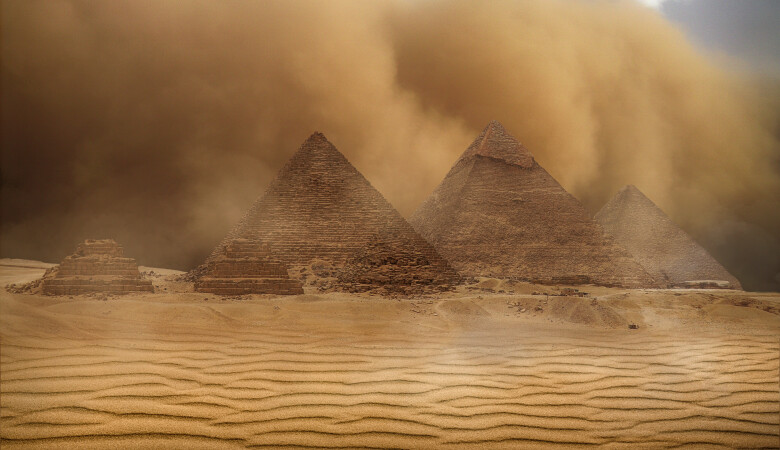The Humble Beginnings of Christ's Glorious Kingdom (Isaiah Sermon 11 of 80)
July 13, 2008 | Andy Davis
Isaiah 11:1-16
The Holy Spirit, Missions, Judgment, Justice of God
Pastor Andy Davis preaches a verse-by-verse expository sermon on Isaiah 11:1-16. The main subject of the sermon is how Christ's kingdom starts out small, but will become glorious and great.
- SERMON TRANSCRIPT -
This morning, we are looking at Isaiah chapter 11. And it's a good time for it too, because this is the season of grandiose promises, and of visions of a glorious future, because it is a season of a presidential campaign. And it is amazing to listen to all of the promises that are made by the candidates, whether of major parties or minor parties. You really ought to make a list of all the things that are in our immediate future. It's looking quite bright, isn't it? And the fact of a long history of broken campaign promises, not necessarily by these candidates, but just by presidential candidates in, for example, the 20th century, doesn't dim those hopes at all.
For example, in 1916 Woodrow Wilson promised to keep the United States out of World War I. And by 1917, we were fighting in World War I. Or in 1928, Herbert Hoover, or at least his campaign around him (I think he later said he never promised any such thing) promised a chicken in every pot and a car in every garage. He did promise to eradicate poverty. That was in 1928. You know that what happened in 1929 and the depression that followed put an end to that promise - hence the denial by Herbert Hoover.
Or then Franklin Roosevelt's pledge in 1932 to maintain balanced budgets and to decrease government spending by 25%. You can find out whether that happened or not. Or then his pledge in 1940 to keep the United States out of World War II. Or how about Lyndon Johnson's famous promise to win the war on poverty through his Great Society? Someone once said of his presidency that, “He fought a war on poverty and poverty won.” But at any rate, there was a grand and glorious vision of a future society free from poverty. Or Richard Nixon's pledge to get the United States out of the Vietnam War. When pressed on details, he implied that there was some kind of a secret plan. No one was ever sure what the secret plan was. I don't think it included Watergate, his near impeachment, and then the fact that in 1975, finally, we ended, and got out of Vietnam.
Or George H W Bush's pledge, "No new taxes, read my lips." Very famous. Of course, at the same time, he was promising to maintain government programs, social programs, and to keep a balanced budget. You can find out how well all of that happened. And so we are in the middle of a presidential campaign, and you are going to hear things like, oh, an end to global warming, or a victory in the war on terror, or the ability to get Republicans and Democrats to work completely together with no discrepancies, or contradictions, or problems whatsoever. Who knows what they are going to promise? It sounds good to me. But as I look at history, I am a bit skeptical. And as I read Isaiah 11, I am yearning for that kingdom to come, and for Christ to reign. But I still think it's fascinating how much we yearn for this kind of thing, and how much we want a glorious future promised to us, and actually fulfilled.
I think no myth or legend has been so strong as the legend of Camelot. You remember King Arthur, the English king of lore and legend, who was a wise and righteous man, powerful and mighty in battle with his sword Excalibur, who gathered around him a bunch of gallant Knights of the Round Table, who carried themselves with great dignity, and wisdom, and defended truth, justice, and I guess the British way, at that particular moment. This was a vision of Camelot, of a perfect society, and it extended even in nature, at least in the 1960 musical called "Camelot." There was a song whose lyrics are very well known, and this is what was decreed for Camelot, according to the musical anyway:
It's true! It's true! The crown has made it clear
The climate must be perfect all the year
A law was made a distant moon ago here
July and August cannot be too hot
And there's a legal limit to the snow here
In Camelot
The winter is forbidden till December
And exits March the second on the dot
By order, summer lingers through September
In Camelot
Camelot! Camelot!
I know it sounds a bit bizarre
But in Camelot, Camelot
That's how conditions are
The rain may never fall till after sundown
By eight, the morning fog must disappear
In short, there's simply not
A more congenial spot
For happily-ever-aftering than here
In Camelot
It is a vision of peace, even extending to nature, of a righteous king who reigns righteously on a throne, of all the people around him doing what is good and right and just - a vision of perfection. And you know what is so amazing? According to scripture, it is too good not to be true. It's too good not to be true, because this is exactly what God has promised us through Jesus Christ. Now, what I think he is doing here in history is letting it be seen plainly that, apart from Christ, and apart from the direct intervention of almighty God, it cannot happen. And so we get to see one form of government, one presidential campaign and rule after another fail, ultimately, so that the ground may be cleared for Jesus Christ, and for the reign of the Messiah on the Davidic throne. And that is the vision that we have in front of us.
I. The Humble Beginning of Christ’s Rule
Humble Beginning: A Branch from A Stump… Israel like a Felled Tree
And it begins humbly. Look at verse one. It says, "A shoot will come up from the stump of Jesse; from his roots a Branch will bear fruit." This testifies very plainly to the humble beginnings of Christ's rule, or the rule of the Messiah. Now the image of a stump is one really of hopelessness. There is just nothing left, it seems, of the Davidic line - nothing left of Judah. It is very humble. It says in Isaiah 6:13, "As the terebinth and oak leave stumps when they are cut down, so the holy seed will be the stump in the land." There is an indication of a termination, but then there is still a vitality to the roots.
Branch: Living Image…
Israel's promise, then, is of a future restoration and glory to come. The branches are of a living image. The shoot that comes up from the stump of Jesse and a branch bearing fruit, are of a living image. Yes, these are small beginnings, but there is hope for a glorious, a bright future. It reminds me of Isaiah 53, that incredible picture of Christ crucified and resurrected, the fruit of which goes and extends to the salvation of the nations. And this is what that prophecy says at the beginning. Isaiah 53:2, "He grew up before him like a tender shoot, and like a root out of dry ground." Again, we see the idea of sterility, of nothing left of Israel, everything laid low, seems to be nothing going on, and out of it comes life. A branch comes forth and this is the Messiah.
And the Messiah is truly Jewish. "Salvation is from the Jews," as Jesus said to the Samaritan woman (John 4:22). The lineage is focused on David, although David isn't mentioned here. Rather, there is a step before that to David's father, Jesse, showing the humble origin even of David. And as you look at the kings in this Davidic line, the kings of Judah have fallen, and it seems, on very hard times. We already have Ahaz, a terribly wicked king who sacrificed his own son to Molech. And after the exile, once the exile comes, there are 14 generations of obscure men who are listed in the genealogies of Matthew and Luke, but we don't know anything about these men. There is nothing significant about them at all, except that God knows that they are in the lineage, from which ultimately will come the Savior of the world, this fruitful branch that is going to come.
So it seems for 14 generations as though nothing is coming. Nothing can come from Israel. Nothing can come from the stump of Jesse. But don't you believe it, because the promise has been given concerning David, that one of his descendants will reign on the throne forever. And so we have already seen this fruitful branch. Isaiah 4:2 says, “In that day the branch of the Lord will be beautiful and glorious, and the fruit of the land will be the pride and glory of the survivors in Israel.” I can't hear that prophecy or this one here in Isaiah 11 without thinking about Jesus' analogy in John 15:5, “I am the vine; you are the branches. If a man remains in me and I in him, he will bear much fruit; apart from me you can do nothing.
And so here is this fruitful branch, Jesus Christ, coming up from the stump of Jesse. The branch is the Messiah. Jeremiah 23:5-6 says, “‘The days are coming,' declares the Lord, 'when I will raise up to David a righteous Branch, a King who will reign wisely and do what is just and right in the land. In his days Judah will be saved and Israel will live in safety. This is the name by which he will be called: The Lord Our Righteousness.’” Oh, any of you who sit there righteous in God's sight today, you can say, "Amen!" to that. The Lord is our righteousness. Jesus is my righteousness. I have no other hope. I am a sinner. All of us have sinned and fall short of the glory of God. What righteousness do we have, apart from this gift from the righteous branch? He is our righteousness. He is the perfect King. And this is the perfect title for the coming King, because we want to be in his Kingdom. We want to be included, and it is going to be a new heaven and a new earth. 2 Peter 3:13 calls it “the home of righteousness.” How can I be there, except that the Lord give me a gift of righteousness? “The Lord Our Righteousness” - that is the branch.
II. The Divine Power of Christ’s rule (vs. 2-3)
“Messiah” = Anointed One, Oil Symbolized Holy Spirit
Then in verses 2-3, we see the divine power of Christ's coming rule, the power of the Lord on him to bring it about, to make something out of nothing, to make this branch come forth, and then that Jesus would reign in this kind of righteousness and power. Look at verses 2-3. It says, “The Spirit of the Lord will rest on him - the Spirit of wisdom and of understanding, the Spirit of counsel and of power, the Spirit of knowledge and of the fear of the Lord - and he will delight in the fear of the Lord.” Despite these humble origins from Jesse, despite this humble origin, yet there is supernatural power in this branch. He is the Messiah.
Now, the word “Messiah” means “anointed one.” And you know that the Davidic kings, in order to be identified as the king, would be anointed by a prophet, or perhaps by a priest. A horn of oil would be poured down on their hair, and it would come down, and trickle down on their beard, or on their hair, and drip down like this. And it was a symbol, a picture, I believe, of the endowing of that Davidic king with the Holy Spirit of God, that the Spirit would come on this individual, and cover him, and enable him to reign wisely and justly.
You remember that Saul received that anointing from the prophet Samuel. And the Spirit of God came on him in power, and so it was said, “Is Saul also among the prophets?” (1 Samuel 10:11). It was a surprise. Nobody really expected it. But you know also that things turned in Saul's ministry and the Spirit of the Lord departed from Saul. We know also that the Spirit of God came on David in power, Saul's successor. But then when David sinned with Bathsheba, he was terrified in Psalm 51:11 where he said, “Do not… take not your Holy Spirit from me,” concerned that the Spirit would leave. And it was a good concern. But this Messiah, this Davidic king, he would be saturated with the Spirit of God. He would be completely covered with the Holy Spirit of God. It says in Isaiah 42:1, “Here is my servant, whom I uphold, my chosen one in whom I delight; I will put my Spirit on him, and he will bring justice to the nations.”
“Seven - fold Spirit” – Revelation 1:4-5; 3:1; 4:5
Now, as we look at Isaiah 11:2, there is this picture of a sevenfold aspect of the Spirit of God, sevenfold. There are three couplets, three times two, and then the statement, “Spirit of the Lord.” So that adds up to seven. There is a sevenfold aspect or ministry of the Spirit of God here. It reminds me of the dedication of the book of Revelation. And in that dedication, dedicated to the Father and the Son and the Holy Spirit, and given from the Father and the Son and the Holy Spirit, there is mentioned there the sevenfold or “the seven spirits before his throne” (Revelation 1:4). So we have a mention of him who is, and who was, and who is to come, and the sevenfold Spirit before his throne, and Jesus Christ, who is the faithful witness. This is the trinitarian picture there in Revelation 1. I think this is an insight, perhaps, into what that means - the sevenfold Spirit or the complete Spirit of God.
And so the complete Spirit of God is going to rest on the Messiah, the Spirit of the Lord, “the Spirit of wisdom and of understanding, the Spirit of counsel and of power, the Spirit of knowledge and of the fear of the Lord” (verse 2). All of this is endowment for reigning, for ruling well.
You remember the story, of course, about young king Solomon, when the time came for him to take up the mantle of leadership of the people of God, from the greatest king they ever had, David, his father, how daunting that was. And how the Lord appeared to Solomon in a dream, and said, “Ask whatever you wish and I'll give it to you.” And how Solomon, humbly, I think, asked for wisdom to be a wise king, that he would reign over God's people with wisdom. And God was clearly pleased with that request and gave him not only greater wisdom than any man had ever seen up to that point (so great, by the way, that people traveled long distances to just listen to his proverbs, and to talk about science and agriculture. Anything they wanted to talk to the king about, he seemed to have all the answers.), but not only that, God also blessed him with glory and honor and power and prestige, unlike any king there had ever been up to that point.
But do you remember what Jesus said about him? He said the Queen of the South “came from the ends of the earth to listen to Solomon's wisdom, and now one greater than Solomon is here” (Matthew 12:42). Jesus's wisdom is infinitely greater than that of King Solomon. He was the perfect God, and therefore perfectly endowed with wisdom, through the Spirit of God, to be a righteous king.
Now, look what it says, speaking first and foremost about the Spirit of the Lord, that he is endowed with the Spirit of God. This is the third person of the trinity, the Holy Spirit, and Christ was saturated with the Spirit of God. Especially Luke, I think, brings this out. Luke 4:1 says, “Jesus, full of the Holy Spirit, returned from the Jordan and was led by the Spirit in the desert, where… he was tempted by the devil.” And then at the end of that time of tempting, in Luke 4:14, it says that “Jesus returned to Galilee in the power of the Spirit.”
By the way, I've often thought about that. The Alpha and the Omega of Jesus's time of testing is a full endowment with the Spirit of God. Oh, that I might always both enter and leave a time of testing filled with the Spirit of God! Both enter and leave that time of testing filled with the Spirit of God. Jesus did that always. He was completely covered with the Spirit of God. And after that it says he went to Nazareth, and as his custom was, he went to the synagogue. And the opportunity came for him to read the scripture. And he opened up to the place in Isaiah where it is written, “The Spirit of the Lord is on me, because he has anointed me” (Luke 4:18). “I am anointed with the Spirit of God.” He is claiming to be Messiah, because after that reading he says, “Today this scripture is fulfilled in your hearing” (Luke 4:21). He is claiming to be Messiah, the Anointed One, anointed by the Spirit of God. And so he was.
But it goes on beyond that, not just the Spirit of the Lord, but also the Spirit of wisdom and understanding. Wisdom means that he knows God's character. He knows God's purposes. He knows the right end and the right means to the end. He also shows good understanding. The implication there is more at a human level. He understands man's character and purposes. Jesus had a special perception, an ability to see into people's hearts, and know who they were, and what they wanted. It says in John 2:24,25 that “Jesus knew all men. He did not need man's testimony about man, for he knew what was in a man.” And in the chapter before that, in John 1:47, he sees Nathaniel coming toward him and says, “Here is a true Israelite, in whom there is nothing false.” In whom there is “no guile” (NASB). There is no trickery in his heart.
And Nathaniel is amazed. he said, "How do you know me?" he said, “I saw you while you were still under the fig tree before Philip called you” (John 1:48). I just looked at you and I knew you. Now, that's Jesus. He is endowed with the Spirit of God, to just know people, to know their hearts. It also says he is filled with “the Spirit of counsel and of power” (Isaiah 11:2). His decisions show practical wisdom. He knows all the proverbs of Solomon and could add 1,000 besides. He knows how to live in this world. And there is also power in Christ. All of that wisdom would mean nothing, if he didn't have the power and the authority to make it happen, to make it stand, to deal with the wicked of the earth.
So Jesus has this perfect combination as a king, wise counsel and total power. And so Matthew 28:18 says, “All authority in heaven and in earth has been given to me.” Or it says in Ephesians 1:22 that “God placed all things under his feet and appointed him to be head over everything for the church.”
And the final couplet is he is filled with “the Spirit of knowledge and of the fear of the Lord” (Isaiah 11:2). “The fear of the Lord,” it says in Proverbs 1:7, “is the beginning of knowledge.”
Delighting in the Fear of the Lord
It's an amazing thing to meditate on Jesus, delighting in the fear of the Lord. And so he does. What an odd combination – “To delight in… fear” (Isaiah 11:3). He himself feared the Lord, and he always did what was right. It was the origin of his perfect wisdom as well, but he also delighted in it. He loved the fear of the Lord. It brought him great joy to walk in the counsel of the fear of the Lord.
And he loved bringing that about in other people. Jesus said, “My food is to do the will of him who sent me and to finish his work” (John 4:34). He delighted in that. He loved that path. And the path was to take sinners like you and me, rebels whose hearts are hard, who are not in any way characterized by these couplets, and to take out our foolish and wayward hearts that do not fear the Lord in any way, and give us instead,a fear of the Lord that is the beginning of wisdom, and the heart of flesh to submit to God's wise rule, to love it, and embrace it for ourselves. He delights in that. It brings him joy to do that to you and me. He delights in bringing fear of the Lord into my heart. He delights in it completely. That was his life's pleasure.
III. The Absolute Justice of Christ’s Rule (vs. 3-5)
So there, Jesus is described for us. He's characterized. He is fit to rule. Amen? He is going to be a good king for us. Look forward to him. Put your hopes on him, not on some candidate. I'm not saying, “Don't be involved in the political process.” I'm just saying, “Put your hope in Jesus,” because he is the only one endowed like this, to reign and to rule so wisely. And look at the justice of his rule. Isaiah 11:3-5: “He will not judge by what he sees with his eyes, or decide by what he hears with his ears; but with righteousness he will judge the needy, with justice he will give decisions for the poor of the earth. He will strike the earth with the rod of his mouth; with the breath of his lips he will slay the wicked. Righteousness will be his belt and faithfulness the sash around his waist.”
Human Judgment: Fleshly and Sense-driven
Here, we see a very clear contrast between the rule and the judgment and justice of Jesus, and that of human judges and kings. Human judgment is fleshly and sense driven. There are fleshly motives, such as earthly gain, and power, and prestige, and personal prejudices. There are fleshly methods also. In contrast to Jesus, they do judge by what they see with their eyes, and they do decide by what they hear with their ears. What else can they do? What else can they do? For man looks at the outward appearance, but it's God alone who can look at the heart.
And then there is the fleshly manner in the way they carry themselves in authority. Jesus put it this way in Matthew 20:25, “You know that the rulers of the Gentiles lord it over them, and their high officials exercise authority over them. Not so with you.” It's just the way they carry themselves. Just like in Matthew 23 with the scribes and Pharisee. They love the flowing robes, and they love to be greeted in the marketplace, in the seat of honors, and all of that kind of thing. That's not Jesus' nature, the pomp and circumstance of it all.
And perhaps, worst of all, throughout history are those fleshly miscarriages of justice. The innocent condemned, the guilty set free. It's happened again and again. I was reading some time ago of a case concerning this man, Tyrone Gamble, October 25th, 1997. He was arrested for a crime he didn't commit. He willingly gave a blood sample for a DNA test. The sample wasn't sent until 46 days later, waiting for a sample from the victim. Three months later, mid-March, the lab conclusively showed that Mr. Gamble was innocent of this crime. But the county police couldn't reach the state attorney general until a month after that. Finally, in mid-April, six months after the start, Gamble's case was thrown out. Gamble, who had been a poor man, sat in prison that whole time, unable to pay the bond to get out. Well, that's a small case. What about executions? What about other things that have happened again and again? The innocents condemned and the guilty set free. It's happened again and again. That will not happen with Jesus as the judge. It cannot happen.
Christ’s Judgment
Of course, the real danger for us is we are all guilty. We'll get to that in a moment, but the cross of Jesus Christ is the only answer to that one. But Jesus doesn't decide in a fleshly manner. There is justice to his reign, straight through. “He will not judge by what he sees with his eyes, or decide by what he hears with his ears; but with righteousness, he will judge the needy, with justice, he will give decisions for the poor of the earth” (Isaiah 11:3,4). He is able to search the heart, just like he did with Nathaniel, to know whether there's guile and trickery or not. “Nothing in all creation is hidden from God's sight. Everything is uncovered and laid bare before the eyes of him to whom we must give account” (Hebrews 4:13). And so he knows exactly what he is doing.
Even Jesus' own enemies acknowledged this. You remember, when his enemies came up trying to trick him, and they said to him, the question about taxation, “Is it right to pay taxes to Caesar or not?” (Mathew 22:17). They wanted to kill him with that one, if they could. But they come with this fawning kind of introduction. “‘Teacher,’ they said, ‘we know you are a man of integrity and that you teach the way of God in accordance with the truth. You aren't swayed by men, because you pay no attention to who they are.’” (Matthew 22:16). That's it. Even his enemies could see that. He wasn't swayed by men, not intimidated. He is not fooled. He is not tricked. He judges by what he sees inside his heart. He judges by righteousness and perfect judgment, not by what he sees with his eyes. And so righteousness is the foundation of Christ's throne.
Righteousness: The foundation of Christ’s Throne
Verse 5, “Righteousness will be his belt and faithfulness, the sash around his waist.” The righteous motive of the glory of God. Jesus said in John 5:30, “My judgment is just, for I seek not to please myself but him who sent me.” So Jesus' motive, as we talked last week about the Assyrians' motive, Jesus' motive is the glory of God in judgment.
The second righteous motive here is the benefit of the poor and needy. “He will not judge by what he sees with his eyes, or decide by what he hears with his ears; but with righteousness he will judge the needy, with justice, he will give decisions for the poor of the earth” (Isaiah 11:4). Now, Judah’s judges, at this point, wickedly oppressed the poor, and they used their positions of power to do it. In Isaiah 3, we've already seen this. Verses 13-15: “The Lord takes his place in court; he rises to judge the people. The Lord enters into judgment against the elders and leaders of his people: ‘It is you who have ruined my vineyard; the plunder from the poor is in your houses. What do you mean by crushing my people and grinding the faces of the poor?’ declares the Lord, the Lord Almighty.” Very concerned about this. But Jesus uses his position to benefit the true poor.
Now here, I believe we must look to the New Testament to interpret who the poor are. I don't believe this is speaking ultimately of a socioeconomic situation. Jesus began the Sermon on the Mount with these words: “Blessed are the poor in spirit, for theirs is the kingdom of heaven” (Matthew 5:3). Those are the ones that benefit from his reign and from his rule, the poor in spirit. The Greek word “poor” is “ptochos,” a beggar, a spiritual beggar. Now, that could be a rich man or it could be a poor man.
Now, we know from 1 Corinthians chapter one that not many are wise or influential, or of noble birth. Not many are the rich and wealthy of the world. James 2:5 says God has “chosen those who are poor in the eyes of the world to be rich in faith.” But the same thing obtains: rich in faith, spiritual beggars. These are the ones that Jesus defends, the ones who know that they have no hope before such a judge, no possibility of surviving judgment day, unless God Almighty moves on their behalf. Those that beg him for salvation, that plead with him by faith, that he would give it to them as a free gift, those are the ones whose judgment he will benefit.
And look at the righteous power behind this judgment, the rod of his wrath, with which he will strike the earth. Jesus is the Word of God. He is the great I Am. And when he strikes the earth, it shakes. He has great power. Revelation 19:11-16 gives us a picture of the second coming of Christ in glory and power.
“I saw heaven standing open and there before me was a white horse, whose rider is called Faithful and True. With justice he judges and makes war. His eyes are like blazing fire, and on his head are many crowns. He has a name written on him that no one knows but he himself. He is dressed in a robe dipped in blood, and his name is the Word of God. The armies of heaven were following him, riding on white horses and dressed in fine linen, white and clean. Out of his mouth comes a sharp sword with which to strike down the nations. "He will rule them with an iron scepter." He treads the winepress of the fury of the wrath of God Almighty. On his robe and on his thigh he has this name written: King of kings and Lord of lords.”
That is the coming savior. That is the coming king, the one predicted here in Isaiah 11. With justice, he judges and makes war. And every single human being, every single person, man, woman, and child who is sitting in this sanctuary today, listening to me, every single one of us will appear before Jesus concerning our lives. Every last one of us.
Christ, Our Final Judge
Let that sink in for a moment. Someday you will give an account to Jesus for your life. In John 5:22,23 Jesus said this: “Moreover, the Father judges no one, but has entrusted all judgment to the Son, that all may honor the Son just as they honor the Father.” Jesus said in Matthew 25:31-33, “When the Son of Man comes in his glory, and all the angels with him, he will sit on his throne in heavenly glory. All the nations will be gathered before him, and he will separate the people one from another as a shepherd separates the sheep from the goats. He will put the sheep on his right and the goats on his left.” And to the sheep, he will give them something none of them have deserved, and they know it: “Come, you who are blessed by my Father; take your inheritance, the kingdom prepared for you since the creation of the world” (Matthew 25:34). And to the goats, he will give them what they truly deserve: “Depart from me, you who are cursed, into the eternal fire, prepared for the devil and his angels” (Matthew 25:41). It is Jesus who will do that. It is his judgment that decides.
And so we see in Revelation 20:11-12, “Then I saw a great white throne and him who was seated on it. Earth and sky fled from his presence, and there was no place for them. And I saw the dead, great and small.” That's all of us, friends. “I saw the dead, great and small, standing before the throne, and books were opened. Another book was opened, which is the book of life. The dead were judged according to what they had done as recorded in the books.” What will you do on that day? How will you survive that perfect judgment? His eyes are like blazing fire. How will you survive when the books are open, and you have to give an account for every careless word that you have spoken? Your only hope is that your name is written in the book of life, that through simple faith in Christ, all of that guilt, which we readily acknowledge through the convicting work of the Spirit of God, all of that guilt could be lifted from us, and put on our substitute, on Jesus Christ, and he'd be crushed under the righteous weight of God's wrath and his judgment for our sins.
This holy and righteous one, who never committed the least sin, that he would stand in our place, and take all of that wrath on himself. Someday you will stand before him and give an account for your life. Will he say to you, “Come, you who are blessed by my Father, blessed freely with a gift of forgiveness, because while you had time, when there was still an opportunity, when it was the day of salvation, you looked by faith to me, and you asked that I would save you, that I would give you my righteousness as a free gift, and I did. And you were confirmed in that with the gift of the Holy Spirit, and in that righteousness, you sought to walk the rest of your life. And therefore, I will cover all of your sins, all of them with my blood, and I will accept you into my kingdom.” Will that be you? Or will you hear those dreadful words, “Depart from me, you who are cursed” (Matthew 25:41). Will you receive what you truly deserve, justice meted out by God, based on his law in eternal punishment?
I beg you, I plead with you, come to Christ. This is the day of salvation. We are still in it now. The sun came up this morning. We don't know that it will come up tomorrow. We don't know. God will teach us eschatology, friends. We don't know what he plans. We have ideas. We have indications from scripture, but he will come when he comes. Are you ready? Are you ready today, to face the judgment?
IV. The Perfect Peace of Christ’s Rule (vs 6-9)
Human Government – Constant Strife
Now, in verses 6-9, we come to the perfect peace of Christ's rule. Now, in human governments, we see constant strife, one government striving after another for world domination. Within each government, jealous officials striving, petty turf battles one after another, human sin and corruption rife, straight through. But there is also strife between the human race and nature itself. I went back to the cursing of the ground back in Genesis 3:17. God spoke to Adam and said, “Cursed is the ground because of you.” Can you imagine hearing that? “Cursed is the ground because of you.” What you did. “Through painful toil, you will eat of it all the days of your life. It will produce thorns and thistles for you” (Genesis 3:17,18).
It says in Romans 8:22, “We know that the whole creation has been groaning as in the pains of childbirth, right up to the present time.” It's groaning, waiting to “be liberated from its bondage to decay” (Romans 8:21). Death, cycle of death, and food chain. I saw a DVD set my mother gave me as a gift, the Discovery Channel on the planet earth. There are lots of jarring scenes in it. Lots of violence, and there was no warning talking about the violence. It was natural violence though. It was a pride of lions getting after a baby elephant. Thankfully, they cut it off before it got really gory. But it's really dangerous out there in the world. It's dangerous because of us, because we have sinned, because nature is not at peace with itself. There is corruption and there is a cycle of violence. Things are being destroyed.
Now, Messiah's rule is going to bring perfect peace, vertical peace with God Almighty, and then horizontal peace with other created beings, and with nature itself. And that, I believe, is predicted here in this passage, a very famous passage. It says, “The wolf will live with the lamb, the leopard will lie down with the goat, the calf and the lion and the yearling together; and a little child will lead them. The cow will feed with the bear, their young will lie down together, and the lion will eat straw like the ox. The infant will play near the hole of the cobra, and the young child put his hand into the viper's nest. They will neither harm nor destroy on all my holy mountain, for the earth will be full of the knowledge of the Lord as the waters cover the sea” (Isaiah 11:6-9).
Interpretation Difficulties… Is This the Millennial Kingdom of the Eternal State?
Now, this is a difficult passage to interpret, if what you're asking me is, “Is this the millennial reign?” Now, what do we mean by the millennial reign? The millennial reign is a 1,000-year period spoken of in Revelation chapter 20, after the second coming of Christ, when the devil is bound up and cast into a pit for 1,000 years. And some are, it seems, resurrected, and will reign with Christ for 1,000 years. It speaks of the 1,000 years six times in those verses.
And in the flow of that book of Revelation, it's after the second coming of Christ, in that passage I just read, Revelation 19, before the new heaven and new earth of Revelation 21, before the great white throne judgment that we've already talked about this morning. There it is, this 1,000-year period. All different theories on it, my friends, all different theories. I'm not going to get into them this morning. But let me say this, in this passage itself, there is one indicator, I think, that this is referring to something short of the new heaven and the new earth, the final eternal state. But whether you accept that difference or not, it doesn't make a difference, because I believe that these things will literally be fulfilled at some point in the future, either in the millennial reign, or in the new heaven, and the new earth.
Therefore, I do not spiritualize the details here. I don't think we ought to do that. I think we ought to look at them and say this is precisely what Jesus is going to come do. And what a glorious picture of his power, isn't it? Now, what is that one verse? Well, the mention of infants, the mention of children. I don't really know how that fits with Jesus' statement, “At the resurrection people will neither marry nor be given in marriage; they will be like the angels in heaven” (Matthew 22:30). I have a hard time finding procreation in the eternal state. And so, therefore, there is an indication, in terms of the infant playing near the hole of the cobra, and the young child putting his hand into the viper's nest, this speaking of something short of the final eternal state. Even more difficult, friends, is Isaiah 65:17, which says, “Behold, I will create new heavens and a new earth.” And a few verses later, it's talking about people who don't live out their years, and if they die at 100, they'll be thought of as young men. I'm saying, “Wait a minute. I thought there would be no more death, or mourning, or crying, or pain in the new heavens and the new earth.” There it gets very complicated and difficult.
My View: This is Speaking of the Full Effects of Christ’s Reign… Including the Millennial Reign on Earth
So, what do I make out of it? I think that there will be a millennial reign, a 1,000-year reign of Christ on earth. I respect those that don't see that. I respect them deeply, as long as they're faithful to the text and have biblical reasons for doing it. But I think there's a physical aspect to Christ's future reign. And I think that he is actually going to have the power to change the nature of animals so that they don't rip and tear anymore, and so the wolf can lie down or live with the lamb. Their essential nature can change. Does not Jesus have that kind of power? Aren't you counting on that? Do you want to go to heaven and spend eternity in your present state? I sure don't. I want my essential nature finished. I don't just want work-in-progress - “Please be patient with me. God isn't finished.” I want him to finish me. I want to be perfect as he is perfect. I want that transforming power. I want to yearn for righteousness and have it actually fulfilled. I want to eat a feast of righteousness for all eternity. Don't you?
And so, yes, he has this kind of power. He can change wolves. He can change lambs. He can get lions to eat straw like an ox if he wants to. He has that kind of power. And yes, a little child can lead them, and an infant can play near the hole of the cobra. Even the physical snake, hijacked, I think, by that ancient serpent Satan (Revelation 12), can be taken back by God. The snake hijacked for Satan’s wicked purposes, cursed as a result. Even he, the snake, the viper, can be reclaimed and no longer harmful on God's holy mountain. Jesus has that kind of power. And I'm counting on that, aren't you? I'm counting on him to change me and to change this world. And I'm looking forward to that. That's the kind of reign that he has.
V. The Universal Reach of Christ’s Rule (vs. 10-12)
Now, look at the universal reach of Christ's rule in Isaiah:10-16. I'm going to read verses 10-12: “In that day the Root of Jesse will stand as a banner for the peoples; the nations will rally to him, and his place of rest will be glorious. In that day the Lord will reach out his hand a second time to reclaim the remnant that is left of his people from Assyria, from Lower Egypt, from Upper Egypt, from Cush, from Elam, from Babylonia, from Hamath and from the islands of the sea.” Look at Verse 12: “He will raise a banner for the nations and gather the exiles of Israel; he will assemble the scattered people of Judah from the four quarters of the earth.” This is the assembly of the people of God, to spend eternity in the presence of this Messianic king, and they include both Jews and Gentiles from the ends of the earth.
Banner for the Nations, a Regathering of the Exiles of Israel
It's a powerful thing. First the Gentiles, that Root of Jesse. He is going to stand as a banner for the peoples and the nations will rally to him. These are Gentiles and they're coming to Jesus. That era is going on right now, the gathering of the Gentiles. And why? Because God said to him, God the Father said to God the Son in Isaiah 49:6, “It is too small a thing for you to be my servant to restore the tribes of Jacob and bring back those of Israel I have kept. I will also make you a light for the Gentiles, that you may bring my salvation to the ends of the earth.” And so the Gentiles are coming to faith in Christ. They're going to stand under the Messianic banner of Jesus, and you are going to say, “He's my king. He's my savior,” this Jewish king, this descendant of Jesse. “He is my king” Christ, the rallying point, lifted high and exalted, he will draw all nations to himself. This is all about missions, friends. It's about the advance of the gospel to the ends of the earth, from Jerusalem, Judea, and Samaria, and even to the ends of the earth. When the Spirit of God comes, he will gather the elect, the chosen people from all nations of the earth, and they will be people from every tribe and language and people and nation. They will stand around that throne.
Glorious Rest!
And it says, “His place of rest will be glorious” (Isaiah 11:10). Oh, it's a place of rest. You are going to enter into God's rest, and there you will rest from all of your labors, just as God rested from his (Hebrews chapter 4). And yes, it's going to be glorious. Revelation 21:10,11: “He carried me away in the Spirit to a mountain great and high, and showed me the Holy City, Jerusalem, coming down out of heaven from God. It shone with the glory of God, and its brilliance was like that of a very precious jewel, like a jasper, clear as crystal.” Oh, his place of rest is going to be glorious. It's going to be beautiful.
Jewish Restoration
But there is also a word here of Jewish restoration. It says, “The Lord will reach out his hand a second time” (Isaiah 11:11). Don't miss that detail. The first time was the physical regathering, I think, under the time of Ezra and Nehemiah, and the rebuilding of the temple at that point. That was the first time that the scattered people of the Jews were regathered. But there is going to be a second regathering.
You could spiritualize it and say that this second regathering is just the success of the gospel among the Jews. But frankly, Romans 9-11 says that most of the Jews aren't believing in Christ. There is just a small remnant that have come to faith in Christ, and that's somewhat of a regathering around Jesus. But I believe that there is a far more glorious regathering yet to come. He is going to reach out his hand a second time, at the end of time, while it's still time, and he is going to gather the Jews through faith in Christ. “They will look on… the one they have pierced, and they will mourn for him as one mourns for an only child,” Zechariah 12:10 tells us. And he is going to reclaim them, and bring them, it says, “From the four quarters of the earth” (Isaiah 11:12). “And so all Israel will be saved, as it is written: ‘The deliverer will come from Zion; he will turn godlessness away from Jacob. And this is my covenant with them, when I take away their sins’” (Romans 11:26,27). That is what Jesus is going to do to his own people. And he will take away that veil that covers their face. And they will see, at last, Christ in their own scriptures, and they will recognize who the Messiah is, and they will look to Jesus, and they will mourn, but it will be tears mingled with joy because, finally, at last, they have assurance that their sins are forgiven through the shed blood of Christ.
And Jesus will gather all of the Jews to himself, he who said, “O Jerusalem, Jerusalem, you who kill the prophets and stone those sent to you, how often I have longed to gather your children together” (Matthew 23:37). That's his yearning. He wants to gather them, as a hen gathers her chicks under her wings, “But you were not willing. Look, your house is left to you desolate. For I tell you, you will not see me again, until you say, ‘Blessed is he who comes in the name of the Lord’” (Matthew 23: 37-39). But at the end, they will finally say to Jesus, this descendant of Jesse, “Blessed are you, the one who came in the name of the Lord, who died for me and for the Gentiles, and we all now stand under one banner, the banner of Christ.”
Verses 13-16 talk about the final effect of that transformation:
“Ephraim's jealousy will vanish, and Judah's enemies will be cut off; Ephraim will not be jealous of Judah, nor Judah hostile toward Ephraim. They will swoop down on the slopes of Philistia to the west; together they will plunder the people to the east. They will lay hands on Edom and Moab, and the Ammonites will be subject to them. The Lord will dry up the gulf of the Egyptian sea; with a scorching wind he will sweep his hand over the Euphrates River. He will break it up into seven streams so that men can cross over in sandals. There will be a highway for the remnant of his people that is left from Assyria, as there was for Israel when they came up from Egypt.”
The great power of God, even greater than happened during the time of the Exodus, that's the language here. Even greater than that, he is going to deliver his people from bondage to sin, and they are going to come to Christ, and they are going to believe in Christ. And the enemies of the people of God will be crushed and destroyed - I believe that's referring to the second coming - as he swoops down on the enemies of Israel and crushes them, finally, and they are gone forever.
Summary: All God’s Chosen People from both Gentiles and Jews to be Gathered into Messiah’s Kingdom
And so all of God's chosen people, from both the Gentiles and the Jews, will be gathered together into one kingdom, and there they will live forever and ever. That's our future.
Why settle for politics? Why settle for a candidate? Look to Jesus for your true hope. That's where we are heading. We are heading toward a glorious kingdom with a king worth worshipping, who will not disappoint us in any way. Verse 12: “He will raise a banner for the nations and gather the exiles of Israel; he will assemble the scattered people of Judah from the four quarters of the earth.”
VI. Review and Application
What we have seen
Well, what have we seen? We've seen the humble beginnings of Messiah's rule like a shoot from a stump. We've seen the divine power of Messiah's rule, the sevenfold Spirit of God saturating Jesus. We've seen the absolute justice of Messiah's rule, not a fleshly justice, but righteous. We've seen the perfect peace of Messiah's rule, heart transformation resulting in eternal peace, even extending to nature itself, a transformation of nature that only God could do. And we've seen the universal reach of Messiah's rule, both Gentiles and Jews rallying, being regathered around this one banner.
How should we then live?
How then should we live? Well, first of all, don't judge God's work by external appearance. The shoot comes up from a sterile stump. It seems like nothing is going on. Learn not to judge a ministry, or a person, or a family by external appearance. Trust in the Lord. Do what is good and right, and let him produce the fruit. Plant good seeds, water them with your tears, and with prayer, and let him do the work. Don't judge it by external appearance. God is at work and he is bringing this kingdom about. Look forward to the perfect reign of Christ. And if God in his wisdom chooses first a millennial reign, short of the eternal state, and then second, eternity, in which these conditions will obtain, praise God. And if he decides to just skip the millennial reign, and go right into the eternal state, none of you who are there enjoying it will complain, I assure you. You'll be delighted and happy to be there. But look forward to it. Feed your minds with it. Put your hope on it. The future is gloriously bright. And allow the sevenfold Spirit of God to saturate your lives, as he saturated Christ's life.
John the Baptist said, “I baptize you with water for repentance. But after me will come one who is more powerful than I, whose sandals I am not fit to carry. He will baptize you with the Holy Spirit and with fire” (Matthew 3:11). Allow Jesus to saturate your day with the sevenfold Spirit of God. And if you lack wisdom, go to Jesus and say, “Send forth now your Spirit of wisdom. I don't know what to do in this situation. I don't know what to do. My husband. My wife. I don't know what to do with my boss, with my employee. I don't know what to do with my financial situation. I don't know what to do with my child. I don't know what to do here, Lord.” Like Jehoshaphat said, “We do not know what to do, but our eyes are upon you, [O Lord]” (2 Chronicles 20:12). Look to him, and ask him to give you this kind of wisdom that we talked about today, and delight in the fear of the Lord. Fear him and obey his commands. Walk in his ways. Don't play loose with grace and think that because you're covered in grace you can live however you want. He still upholds his commands. Live in the fear of the Lord. Delight in the fear of the Lord and be blessed in that.
And finally, take part in that regathering. It's going on, praise God. Pray for the missionaries that your church supports, for both their internal journey of sanctification and the external journey of the advance of the gospel. And pray for others that you know, that aren't connected with your church, but you know they're doing good ministry of regathering both Jews and Gentiles brought into the Kingdom. Get involved in that.































